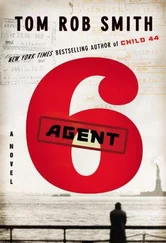Tom Smith - The Secret Speech
Здесь есть возможность читать онлайн «Tom Smith - The Secret Speech» весь текст электронной книги совершенно бесплатно (целиком полную версию без сокращений). В некоторых случаях можно слушать аудио, скачать через торрент в формате fb2 и присутствует краткое содержание. Жанр: Триллер, на английском языке. Описание произведения, (предисловие) а так же отзывы посетителей доступны на портале библиотеки ЛибКат.
- Название:The Secret Speech
- Автор:
- Жанр:
- Год:неизвестен
- ISBN:нет данных
- Рейтинг книги:5 / 5. Голосов: 1
-
Избранное:Добавить в избранное
- Отзывы:
-
Ваша оценка:
- 100
- 1
- 2
- 3
- 4
- 5
The Secret Speech: краткое содержание, описание и аннотация
Предлагаем к чтению аннотацию, описание, краткое содержание или предисловие (зависит от того, что написал сам автор книги «The Secret Speech»). Если вы не нашли необходимую информацию о книге — напишите в комментариях, мы постараемся отыскать её.
The Secret Speech — читать онлайн бесплатно полную книгу (весь текст) целиком
Ниже представлен текст книги, разбитый по страницам. Система сохранения места последней прочитанной страницы, позволяет с удобством читать онлайн бесплатно книгу «The Secret Speech», без необходимости каждый раз заново искать на чём Вы остановились. Поставьте закладку, и сможете в любой момент перейти на страницу, на которой закончили чтение.
Интервал:
Закладка:
After Leo’s encounter with Fraera on the excavated grounds of the Church of Sancta Sophia he’d returned to the hospital to discover that Raisa had survived surgery and that the doctors were confident of a full recovery. Waking up, her first question had been about Zoya and Elena. Seeing how pale and weak she was, Leo had promised that he was concentrated entirely on his kidnapped daughter. Listening to him explain Fraera’s demands, Raisa had merely said:
Do whatever it takes.
FRAER A HAD GAINED CONTROL of a criminal gang. As far as Leo could tell she was no torpedy , no mere foot soldier — she was the avtoritet , the leader. Members of a criminal gang, the vory , were typically contemptuous of women. They wrote songs about their love for their mother, they killed each other over insults to their mothers, but nurtured no belief in women being equals. Somehow the wife of a priest, a woman who’d spent her life in her husband’s shadow, assisting his career, had managed to penetrate the vorovskoi mir . Even more astounding was that she had risen to the top. Fraera was integrated into their rituals: her body covered with tattoos, her birth name tossed aside and replaced with a klikukha , a vory nickname. Sheltered within the highly secretive vorovskoi mir , her operations were probably funded by pickpockets and black market trade. If revenge had been her intention from the outset then she’d chosen her allies well. The vory gangs were the only organizations the State had no control over. There was no chance of infiltrating their ranks: it would take too much time— requiring an officer to spend years undercover, to murder and rape in order to prove themselves. It wasn’t that the State couldn’t find a suitable candidate but rather that they had always considered the vory an irrelevance. These gangs were motivated by their own internal, closed system of loyalty and reward. None of the gangs had ever shown any interest in politics, until now, until Fraera.
Had Fraera’s demand — the release of her husband — come before her murders, it might have been achievable. The penal system was in upheaval following Khrushchev’s speech. Regarding Lazar’s twenty-five-year sentence, Leo could have applied for a special dispensation, a dismissal or an early parole. The complication would have been Khrushchev’s renewed antireligious campaign. However, after the murders there was no chance of negotiating for Lazar’s release. No deal would be struck. Fraera was a terrorist, to be hunted down and killed irrespective of whether or not Zoya had been taken hostage. Fraera’s gang had been classified as a counterrevolutionary cell. To make matters worse, she’d made no attempt to curtail her bloodlust. In the days directly after Zoya’s kidnapping Fraera’s men had murdered several officials — men and women who’d served under Stalin. Some had been tortured as they’d tortured others. Faced with a reflection of their own crimes, the upper echelons of power were terrified. They were demanding the execution of every member of Fraera’s cell and every man and woman who aided them.
Fortunately Leo’s boss, Frol Panin, was an ambitious man. Despite the KGB and the militia launching the largest manhunt Moscow had ever seen, they’d found no trace of Fraera and her gang. Clamorous calls for their capture were answered with failure. The press reported nothing of these events, opting for celebrations of industrial statistics on the days after the most shocking of executions, as if these numbers might dampen the rumors sweeping the streets. Officials were moving their families out of the city. A surge in holiday requests had been submitted. The situation was intolerable. Coveting the glory of being the one who snared Fraera, the mantle of a heroic monster slayer, Panin saw Lazar as bait. Since they couldn’t arrange for him to be released through normal channels, without admitting the State could be held to ransom, the only option was to break him out. Panin had hinted that their project had powerful supporters and was proceeding with the tacit consent of those in charge.
Lazar was a convict in the Kolyma region, Gulag 57. Escape was considered impossible. No one had ever succeeded. Security at many of the Gulags was little more than their location: there was no means of surviving outside the compound. The chances of traversing the vast and unforgiving terrain on foot were negligible. If Lazar went missing he would be declared dead. With Panin’s help, it was a simple matter to get into the Gulag, fabricating the necessary paperwork, positioning Leo as a prisoner. Getting out, however, would not be so easy.
Vibrations raced through the hull. The ship’s bow veered to the side. Leo sat bolt upright. They’d hit ice.
SAME DAY
GENRIKH RUSHED FORWARD, peering over the side. A sunken mass of ice slowly passed by, its pinnacle no larger than a car, the majority of its bulk underwater appearing as a vast dark blue shadow. The hull appeared intact. There was no shouting from the prisoners down below. No water was leaking in. Feeling sweat under his reindeer fur, he signaled to the captain that the danger had passed.
In the first voyages of the year the bow occasionally knocked against remnants of the ice mass, collisions that made an ominous noise against the aging hull. In the past these collisions used to terrify Genrikh. The Stary Bolshevik was a sickly vessel: no good for trade or commerce, suitable only for convicts — barely able to cut a path through water let alone brush aside ice. Built for a speed of eleven knots, the coal-fired steamer never managed much above eight, puffing like a lame mule. Over the years the smoke coming from the single funnel, located toward the stern, had turned darker and thicker, the vessel moved slower while the creaking had become louder. Yet despite the ship’s worsening health Genrikh had gradually lost his fear of the sea. He could sleep through storms and hold down meals even when plates and cutlery clattered from side to side. It wasn’t that he’d grown brave. Another more pressing fear had taken its place — a fear of his fellow guards.
On his first voyage he’d made a mistake that he’d never been able to put right, one that his comrades had never forgiven. During Stalin’s reign the guards frequently colluded with the urki —the career criminals. The guards would organize a transfer of one or two female prisoners into the male hold. Sometimes the women’s cooperation was bought with false promises of food. Sometimes they were drugged. Sometimes they were dragged, fighting and screaming and shouting. It depended on the tastes of the urki , many of whom enjoyed snuffing out a fight as much as sex. Payment for this transaction was information on the politicals — convicts sentenced for crimes against the State. Reports of things said, conversations overheard, information that the guards could translate into valuable written denunciations when the ship reached land. As a small bonus the guards took final turns with the unconscious women, consummating an allegiance as old as the Gulag system itself. Genrikh had politely declined to join in. He hadn’t threatened to report them or shown any disapproval. He’d merely smiled and said:
Not for me.
Words that he’d come to regret more bitterly than anything he’d ever done. From that moment he’d been shunned. He’d thought it would last a week. It had lasted seven years. At times, trapped on board, surrounded by ocean, he’d been mad with loneliness. Not every guard joined in the rapes all of the time, but every guard joined in some of the time. However, he was never offered the chance to put good his mistake. The initial insult stood uncorrected since it didn’t express a preference such as: he didn’t feel like it today but a gut reaction: this is wrong . On occasion, pacing the deck at night, longing for someone to talk to, he’d turned to see the other guards gathered away from him. In the darkness all he could make out were their smoldering cigarettes, red butts glowering at him like hate-filled eyes.
Читать дальшеИнтервал:
Закладка:
Похожие книги на «The Secret Speech»
Представляем Вашему вниманию похожие книги на «The Secret Speech» списком для выбора. Мы отобрали схожую по названию и смыслу литературу в надежде предоставить читателям больше вариантов отыскать новые, интересные, ещё непрочитанные произведения.
Обсуждение, отзывы о книге «The Secret Speech» и просто собственные мнения читателей. Оставьте ваши комментарии, напишите, что Вы думаете о произведении, его смысле или главных героях. Укажите что конкретно понравилось, а что нет, и почему Вы так считаете.












